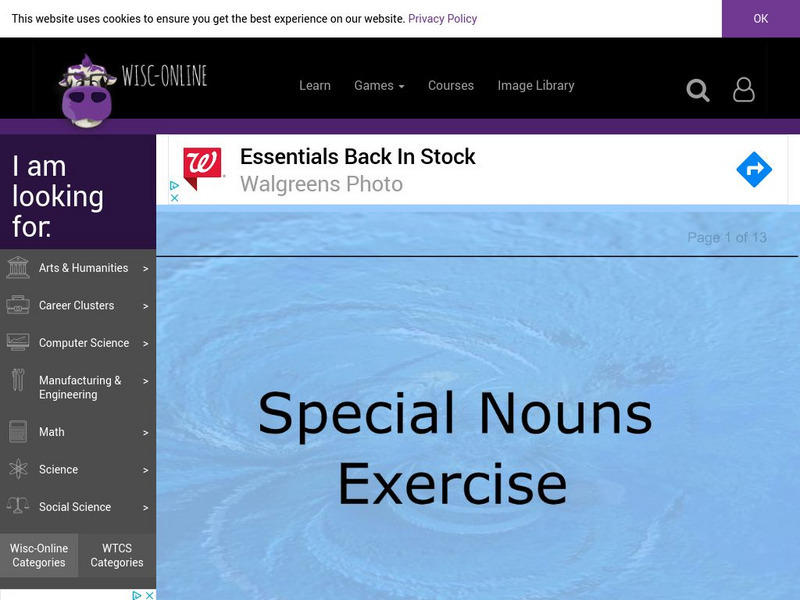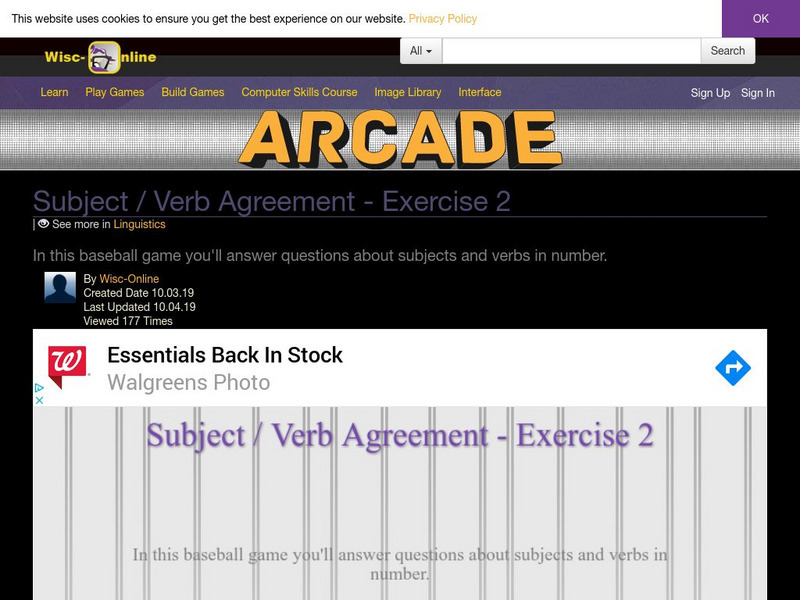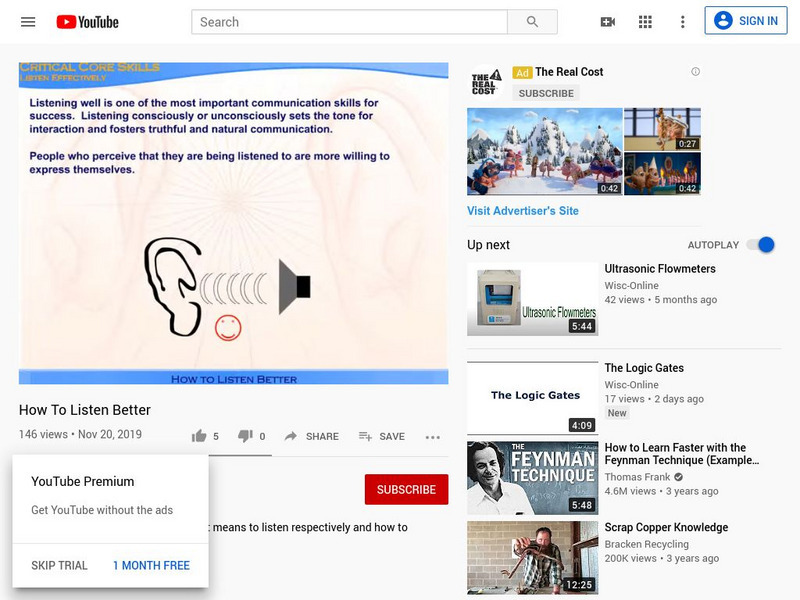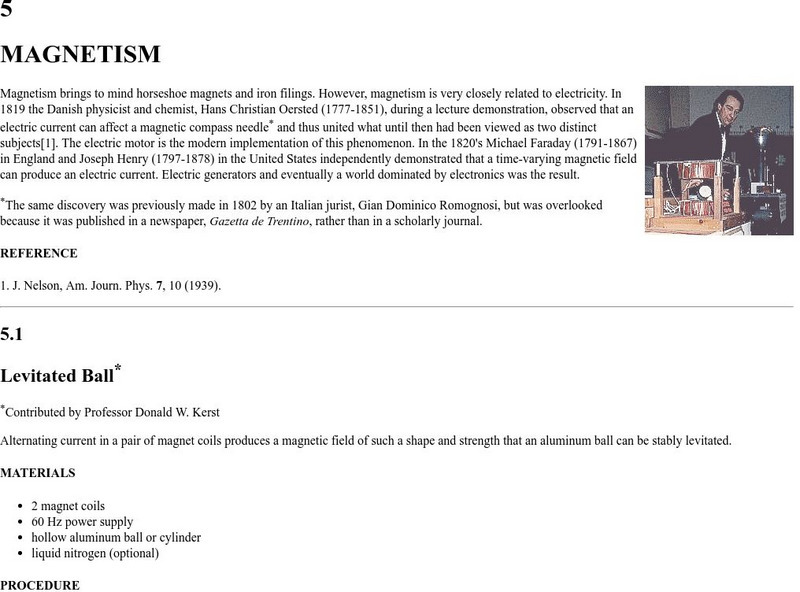Wisc-Online
Wisc Online: Determining the Specific Purpose of Your Speech
In this learning activity, you'll review the general principles speakers use to create a specific purpose statement. At the end, practice what you learned by choosing the correct purpose statement for a brief speech.
Wisc-Online
Wisc Online: Noun/pronoun Agreement: Exercise 1
Students select the correct pronoun to match the given noun in a 20-question exercise.
Wisc-Online
Wisc Online: Using Commas in a Series
In this learning module, students read about the rules for using commas to divide nouns, verbs, and adjectives when the words are written in a series. They insert commas in a practice exercise with 25 questions and receive immediate...
Wisc-Online
Wisc Online: Avoiding Design Mistakes When Creating Visuals
Using visuals in a speech can enhance the speech and captivate the audience, only if used effectively. Review design errors and learn how to avoid them when choosing visuals for your speech. SL.11-12.5 Audio Visuals
Wisc-Online
Wisc Online: Special Nouns Practice
In this practice execise, students will identify nouns referring to qualities, ideas, and emotions.
Wisc-Online
Wisc Online: Subject Verb Agreement Exercise 2
This is a 20-question exercise/quiz matching subjects and verbs in number.
Wisc-Online
Wisc Online: Special Nouns
In this learning module, students review abstract nouns referring to qualities, ideas, and emotions.
Wisc-Online
Wisc Online: Nouns: Count and Noncount
In this interactive lesson, learners study examples of nouns that can be counted and nouns that cannot. They then identify whether a word is a "count" or a "noncount" noun in a practice exercise.
Wisc-Online
Wisc Online: Using Modifiers
In this interactive object, learners read about words that give information about another word in a sentence. Students also practice placing modifiers in sentences in drag and drop exercises.
Wisc-Online
Wisc Online: Ged Essay Writing Formula for Success
In this learning module, students review the format for a five-paragraph essay, which is the second part of the GED Writing Test.
Wisc-Online
Wisc Online: English Words of French Origin
In this learning activity, students read and listen to English words from the French language.
Wisc-Online
Wisc Online: The You View
Students will write effective business messages that incorporate a second-person point of view and focus on the benefit to the reader. This approach is often used to create positive messages, neutral messages, and inquiry messages in...
Wisc-Online
Wisc Online: Writing Effective Paraphrases
In this learning module, students practice paraphrasing brief, non-fiction passages.
Wisc-Online
Wisc Online: Summary Writing
In this learning module, students demonstrate an understanding of summary writing by reading step-by-step instructions and then summarizing short paragraphs. Examples of summaries that are poorly written, as well as those that are...
Wisc-Online
Wisc Online: Concluding Your Speech
The conclusion of a speech is your last chance to stress your main idea and purpose. How can you make it memorable? Follow these guidelines to write a strong conclusion to a speech.
Wisc-Online
Wisc Online: Introducing Your Speech
Follow these do's and don'ts of writing an effective introduction to a speech that will grab your audience's attention and state your central idea. Use the arrows to move through the information.
Wisc-Online
Wisc Online: Can You Speak Hmong?
In this learning module, students see and hear basic Hmong, a Chinese dialect, phrases.
Wisc-Online
Wisc Online: Plagiarism
Never worry about plagiarising again! Learn from this tutorial what plagiarism is and view examples. Test yourself at the end of the slideshow to see if you can recognize plagiarism.
Wisc-Online
Wisc Online: Developing the Central Idea
What do you want your audience to remember the most about the topic of your speech? This is will be your central idea and it can be boiled down to one sentence! Follow these guidelines for writing a concise central idea and then practice...
Wisc-Online
Wisc Online: How to Listen Better
Students read a description of what it means to listen respectively. Then they write a brief action plan for becoming a better listener.
Wisc-Online
Wisc Online: Writing the Ged Essay Using Transitional Words
A critical part of the writing process is using transitional words and phrases to let the reader know when a change is coming. Learn more about how to use transitions and acquaint yourself with examples of transitional words.
University of Wisconsin
University of Wisconsin: 5 Magnetism
From an online teacher demonstration book. Includes a description and explanation of five demonstrations on a variety of magnetism topics. Interesting and captivating demos.
University of Wisconsin
University of Wisconsin Madison: Italian Life Under Fascism
This virtual exhibit looks at the world of Italian Fascism during the 1920s, '30s, and early '40s, including its propaganda, fascist youth organizations, women and Fascism, and more.






















